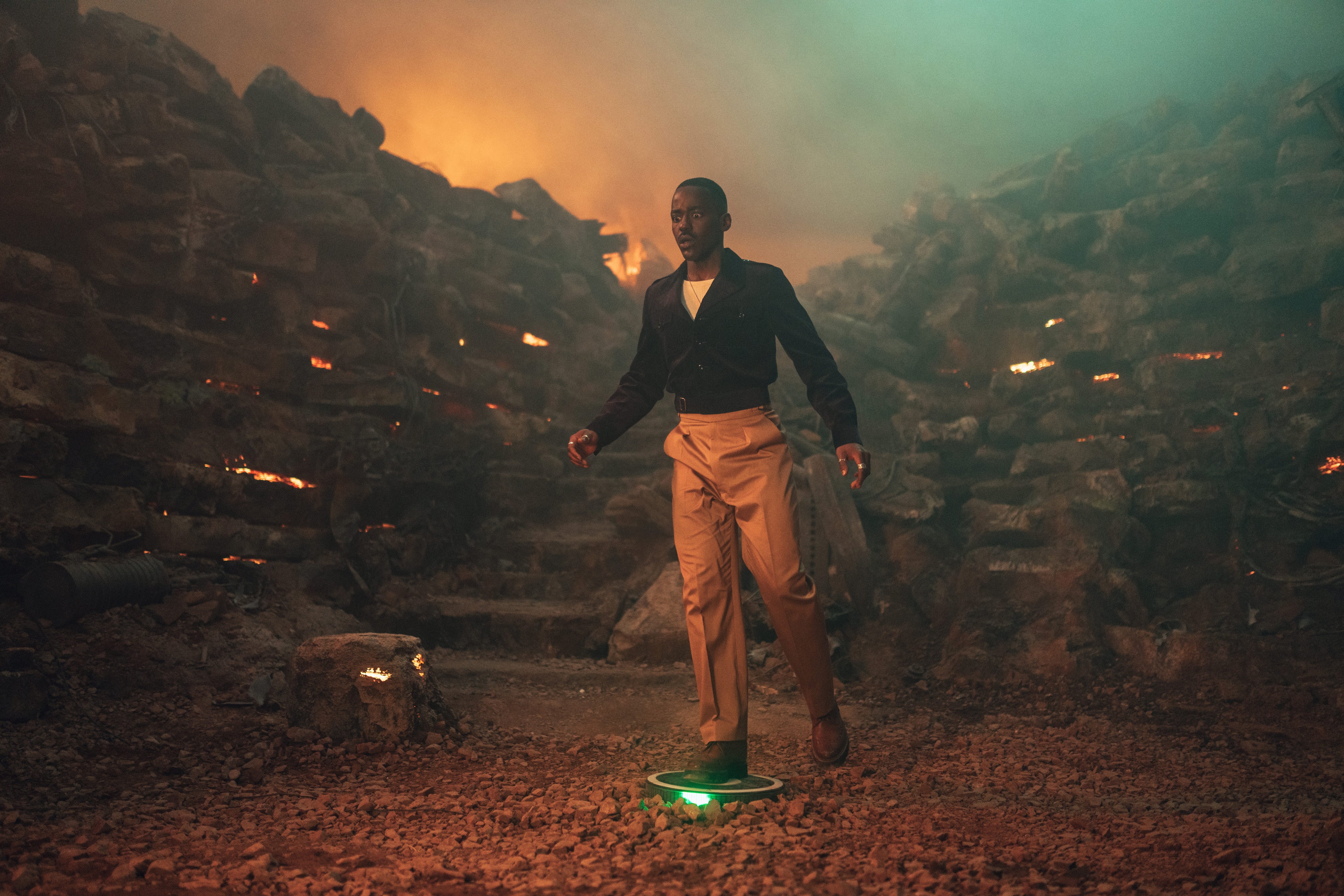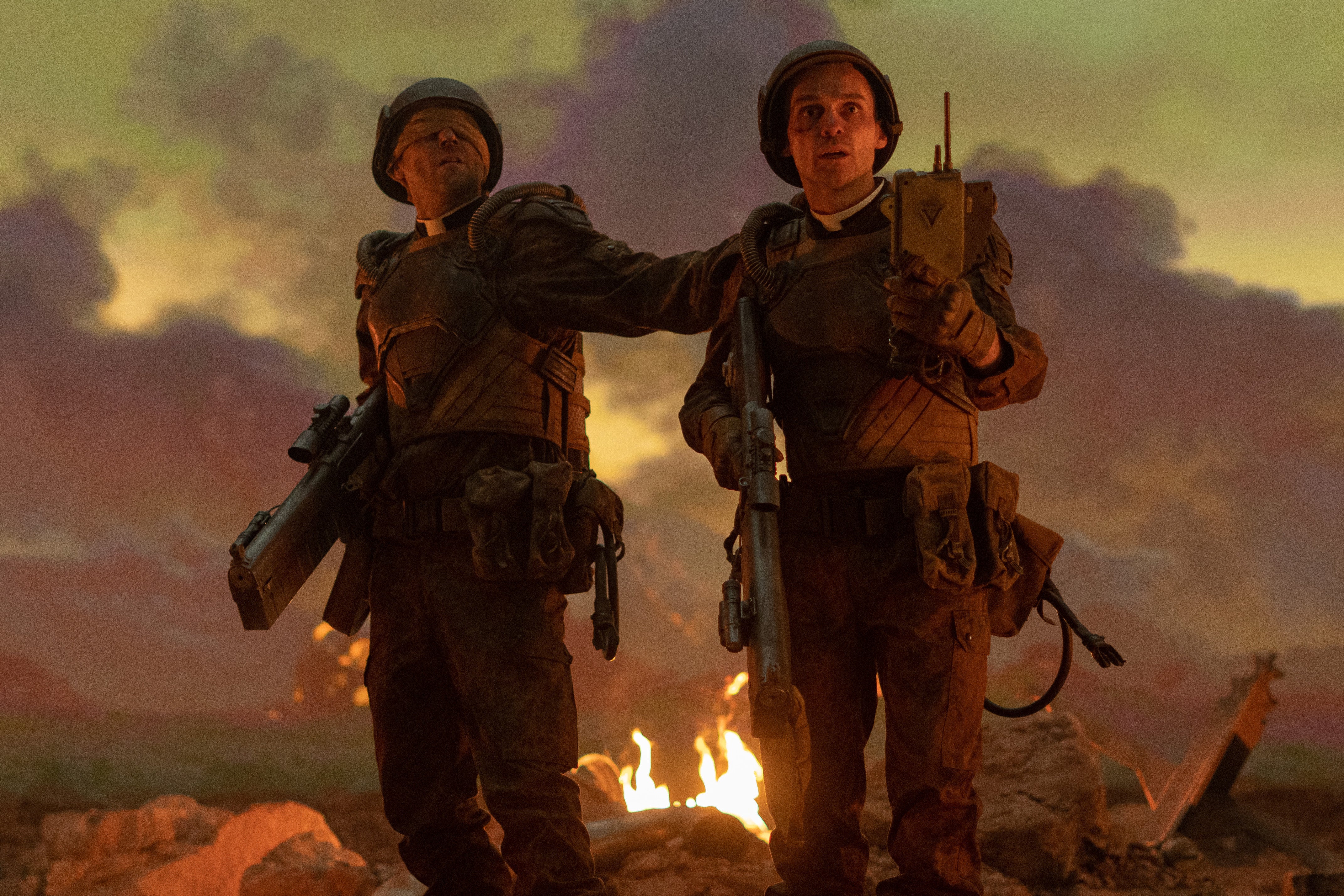Doctor Who: Boom review – A bit of a damp squib only saved by brilliant performances
This episode wrestles with chunky themes – the dangers of AI, religious extremism, and the parasitic wickedness of the arms industry. But the execution is wishy-washy

Warning: this review is also a recap, meaning it contains spoilers for the episode
Doctor Who is putting the band back together. Returning showrunner Russell T Davies was the driving force behind the Doctor’s rebirth in the 2005 Christopher Eccleston/Billie Piper era. Meanwhile, the writer of this third episode, Steven Moffat, made perhaps the most significant modern contribution to Whovian lore as the creator of the Weeping Angels. Scarier than the Daleks, weirder than the Zygons, and more aesthetically pleasing than the Cybermen, they are, hands down, the greatest Doctor Who monsters ever.
How do you top that? Well, not with “Boom”, a so-so episode best enjoyed as a showcase for the excellent new Doctor Ncuti Gatwa. He’s on screen practically the entire runtime, and has to laugh, cry and recite poetry while balanced on a flashing green plinth that could explode at any moment – a daunting mission he effortlessly completes.
That’s just as well, because “Boom” is otherwise a bit of a damp squib. It wrestles with chunky themes – the dangers of AI, religious extremism, and the parasitic wickedness of the arms industry. And it introduces us to the Doctor’s future companion, space marine Mundy Flynn (Varada Sethu). But the execution is wishy-washy, and on more than one occasion, Moffat risks contradicting himself (hardly a surprise given the mind-bending leaps of logic in his scripts for Benedict Cumberbatch’s Sherlock).
For instance, “Boom” tells us in no uncertain terms that the Doctor is hostile to religion, which he declares to have been a militarised force for most of the history of humanity. But at the end, he advises another character to “keep the faith”, adding, “Just because I don’t like it, doesn’t mean I don’t need it.” So which is it? Do make up your mind, Mr Moffat.
The action begins with two figures wandering across the smoke-filled desert planet of Kastarion 3. Back in the day, this scene would have been shot in one of those 1970s quarries the BBC sci-fi department used to have on permanent speed dial. Nowadays, alas, it’s wall-to-wall CGI – visually more impressive but at the expense of the cheesy charm of yore.
The duo are holy soldiers from a faraway future in which – and yes, I am typing these words – space-going Anglican Ministers travel around the universe waging war. It’s Starship Troopers meets The Vicar of Dibley, with some Warhammer 40K sprinkled on top – and entirely as silly as that sounds.
One of the pair, John Francis Vater (Joe Anderson), who has bandages over his eyes and is blinded, calls his daughter, Splice (Caoilinn Springall), to check she’s remembered to brush her teeth. It turns out that phone call is one of the last things he does.

Things suddenly take a turn for the disastrous. A robotic mobile ambulance unit appears through the fog, its screen flashing the face of a scary old lady (Susan Twist). Vater’s companion accidentally steps on a mine and is reduced to atoms. Unperturbed, the ambulance scans Vater’s body, notes his blindness and decides the most cost-effective course is to zap him to oblivion – which it does.
Scarcely has the dust settled than the Doctor and companion Ruby (Millie Gibson) arrive by Tardis. The Doctor twigs they’re in a war zone, but then the smartest person in the universe does something uncharacteristically stupid by stomping on a mine. It’s a special bomb that doesn’t detonate until it satisfies itself that the object standing upon it is a living thing (how does this make sense – surely it would be cleverer for the mine to just go for it and blow up?).
The Doctor is trembling on one leg. He needs to redistribute his weight so that he can shift his body and put his foot down (much like Indiana Jones, the bag of sand and the Mayan idol at the start of Raiders of the Lost Ark). So it’s a lucky thing Ruby has discovered a tube lying around nearby. Only it’s not actually a tube – it’s the vacuum-sealed remains of Vater, whose digital ghost they accidentally conjure by pressing a random button.
The Doctor is still trapped on the mine – but his imminent destruction becomes the least of his worries when Vater’s daughter shows up, along with another Anglican soldier, Mundy.
Mundy has blue tidings for the Doctor. The bomb has a timer and will go off eventually, no matter what he does. And he has a bombshell of his own. Because of the Doctor’s special Time Lord physiology, the detonation will turn him into a living explosive, eviscerating everything for miles.

Meanwhile, Ruby is struggling to work out who the heroes are fighting exactly. Nobody has ever laid eyes on the supposedly cruel and vicious Kastarions – though there are rumours they live in the smoke or the mud. Then another ambulance bot turns up, and sets its sights on the Doctor. Ruby tries to lead it away but, in the confusion, is shot by Canterbury (Bhav Joshi), a soldier from HQ who has a crush on Mundy and wrongly believed Ruby was about to kill her (by now everyone is essentially running around waving weapons in the air).
Finally, the Doctor cracks it: there are no baddies. Instead, a nefarious weapons manufacturing conglomerate has tricked Vater and his crew into waging war against a non-existent foe to help corporate profits tick along. Their algorithm keeps the death count up by eliminating soldiers with minor injuries, such as Vater – thus fuelling the Space Vicars’ paranoia about being locked in a deadly conflagration.
At this point, dozens more ambulance ladies swarm around. All is lost – until Vater’s spectral AI downloads himself into the lead lady-bot, disarms the mine and sends the killer ambulances packing – after they have healed Ruby.
It’s a reasonably satisfying – if mind-boggling – conclusion to a tense situation, albeit reminiscent of the end of ancient sci-fi movie Independence Day, where a computer virus defeats the aliens. But there’s a queasy turn when little Splice informs the Doctor she’s OK with her dad having been atomised because “he’s not gone… he’s just dead”. He tells her to keep the faith – having spent the previous 40 minutes dissing religion and its warlike tendencies.
“Her dad is dead,” notes Ruby. “We’re all dead eventually” is the Doctor’s chirpy reply (note to Mr Moffat: please don’t consider becoming a grief counsellor). It’s a weird full stop to a wonky episode that also features more of that mysterious snow that follows Ruby around, and will (presumably) be eventually explained.
Gatwa and Gibson fizzle with charisma and have genuine chemistry, while newcomer Sethu brings a nice low-key warmth – although she doesn’t have a lot to do in the episode beyond looking sad when Canterbury is atomised by the killer ambulance robots.
Sethu isn’t a big, attention-grabbing presence like Gatwa and Gibson, but you can imagine her understated acting style playing nicely off other two residents of the Tardis when she joins on a permanent basis (the indications are it will be next season). And it’s just as well that the performances are so accomplished, because the off-kilter script needs all the help it can get. Forget Weeping Angels. Here, the only tears will be those shed by frustrated Whovians wondering why, despite a great cast and top-notch production values, the new Who can’t seem to get its mojo running.
Join our commenting forum
Join thought-provoking conversations, follow other Independent readers and see their replies
Comments
Bookmark popover
Removed from bookmarks